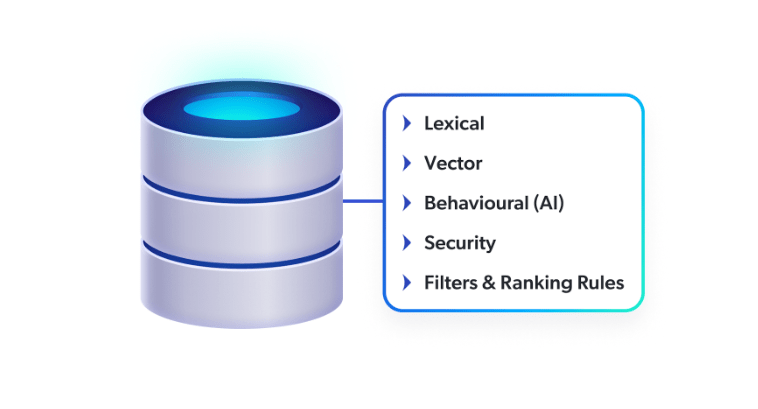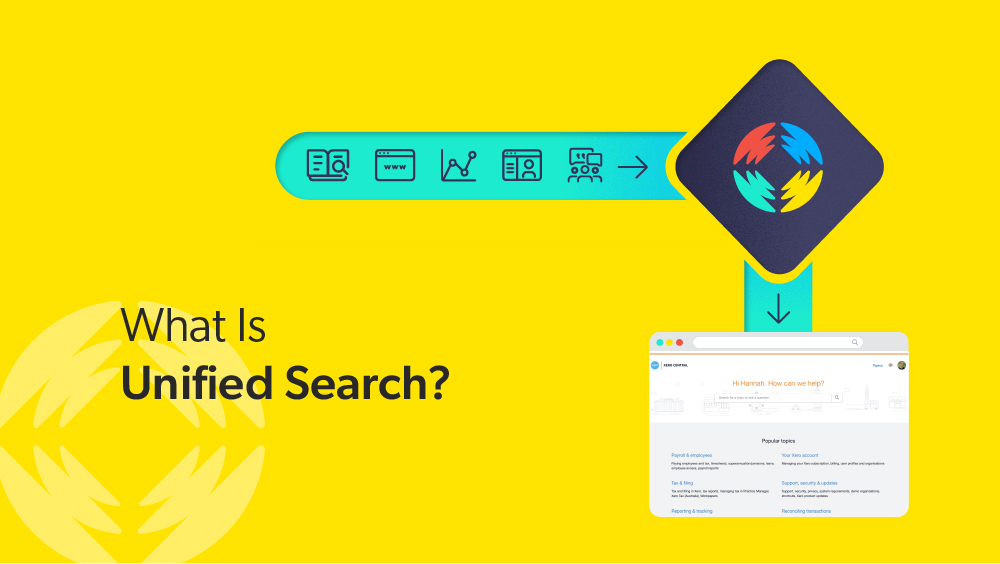You’ve invested millions in best-of-breed enterprise platforms, like Salesforce for CRM, ServiceNow for IT, SAP for operations, Sitecore for content management. Each decision was strategic and chosen to solve specific business challenges. Yet somehow, your digital ecosystem feels more fragmented than ever.
Employees waste hours hunting for information across multiple systems. Customers can’t find the answers they need and abandon their journey for your competitors. Support teams provide inconsistent responses because they can’t access the full picture of customer interactions. Despite having more data and better tools than ever before, decision-making feels slower and less informed.
If this sounds familiar, you’re not alone. Most enterprises operate across distinct content repositories, with roughly 80% of your most valuable information locked away in unstructured formats — documents, videos, emails, and other content that doesn’t fit neatly into databases. The very systems you’ve invested in to drive efficiency have created new barriers to productivity.
Your IT team has likely proposed costly migration projects or platform consolidations. But there’s a more strategic approach that leverages your existing investments while building the foundation for future innovation: unified search. More than just finding information faster, a properly architected unified search index becomes the connective tissue that transforms disparate systems into a cohesive, intelligent enterprise platform — and the essential foundation for AI initiatives that actually deliver business value.
Why Unified Search Is the Key to Enterprise Connectivity
Unified search represents a fundamental shift in how organizations approach information access and management. Rather than forcing users to know where information lives across multiple systems, unified search connects those data sources to create a single index that can simultaneously access, understand, and surface relevant information across multiple data sources. Contrast this with a federated search engine, which links to the indexes within your existing tech stack — while content is retrieved into a single search interface, it’s not ranked consistently regardless of source.

At its core, unified search operates through a sophisticated indexing process that ingests content from disparate enterprise systems, normalizes it into a searchable format, and applies advanced machine learning models to deliver the most relevant results. This approach eliminates the friction of platform switching while maintaining the security and permissions structures of your existing systems.
And the impact of unified search extends far beyond simple information retrieval; here are other benefits that can have a huge impact on your business:
Reducing Cognitive Overload
In an era of information overload, unified search serves as an intelligent filter that helps reduce cognitive burden while creating more cohesive digital experiences. When users can find what they need quickly through a single, intelligent interface, it eliminates the mental overhead of remembering which system contains which information.
This cognitive relief transforms your digital ecosystem from a source of frustration into a productivity enabler, making your platforms destinations rather than obstacles.
Creating Connected Customer Journeys
Digital touchpoints don’t exist in isolation, and unified search helps organizations recognize and leverage these connections. Consider a customer who encounters an issue while shopping on an ecommerce site and then contacts customer support. With unified search, the support agent has immediate access not only to relevant troubleshooting information but also to the customer’s recent activity and previous attempts to resolve the issue.
This context enables faster, more personalized support that improves customer satisfaction while reducing resolution time.
Relevant reading: End-to-End Digital Customer Experience: Don’t Skip These 10 Areas
Informing Business Strategy Through Search Analytics
Unified search platforms collect valuable analytics about not only what users are searching for, but what content is most popular and identifying gaps when content cannot be found. These insights can inform everything from content development to marketing campaigns to product development decisions.
For example, if search analytics reveal that customers are frequently looking for a specific product feature that doesn’t exist, that signals a potential development opportunity. Conversely, unexpectedly popular content might indicate emerging trends worth leveraging in marketing campaigns.
The Power of Coveo’s Enterprise-Grade Unified Index
Coveo’s approach to unified search is built on a proprietary index that has been refined over two decades of enterprise search innovation. This index offers several key advantages specifically designed for enterprise environments:
Comprehensive Content Ingestion
One of the biggest challenges organizations face today is format fragmentation—critical information remains locked away in unsearchable formats across the enterprise.
PDFs become digital filing cabinets that require manual browsing, video content sits unusable without transcription, and image-based documents like scanned contracts become invisible to search engines. The technical challenge is immense, as each file type requires specialized parsing logic, and maintaining compatibility across hundreds of format variations demands significant ongoing engineering resources that most IT teams simply don’t have.
Coveo addresses this challenge by ingesting and normalizing over 100 different file types across 15 document categories (including the unstructured content we mentioned above — PDFs, videos, and the endless PowerPoint decks), ensuring that no valuable content is left behind. From traditional documents and spreadsheets to multimedia files and web content, everything becomes searchable through a single interface, eliminating the format barriers that traditionally keep enterprise knowledge locked away.

Early-Stage Security Binding
Many organizations today face an impossible choice between security and searchability. Traditional approaches require either sacrificing security by making content broadly accessible for search, or accepting that secured content remains unfindable.
The complexity multiplies exponentially when dealing with multiple data sources, each with their own permission structures, group hierarchies, and access control models. Manually synchronizing permissions across systems is not only time-intensive but introduces significant security risks and compliance violations, leading many enterprises to abandon unified search entirely rather than navigate this security maze.
Coveo solves this through early-stage security binding during the indexing process, where access control permissions from source systems are replicated and enforced at the document level. This ensures users only see content they’re authorized to access, maintaining security while enabling broad content discovery across all enterprise systems.

Universal Connectivity
Point solutions that solve individual problems on a departmental level have a butterfly effect on the overall digital journey, isolating answers across multiple sources. These organizational silos force organizations to choose between expensive, risky migration projects or accepting fragmented user experiences.
Building and maintaining custom integrations is a massive undertaking — each system has unique APIs, authentication methods, and data structures that require specialized expertise. The technical debt accumulates quickly as platforms update their interfaces, breaking integrations and requiring constant maintenance. Without native connectors, IT teams spend months building what should take hours to deploy, often abandoning integration projects due to their complexity and cost.
Coveo eliminates this challenge with more than 30 native and universal connectors that can securely connect to hundreds of enterprise systems without requiring content migration. Whether you’re using Salesforce, ServiceNow, SharePoint, Confluence, or any of dozens of other platforms, content can be indexed while remaining in its original location, breaking down silos without the technical complexity of custom integration development.

Relevant reading: Limitless Connectivity? Why Quality Matters Over Quantity in Enterprise Search Connectors
Hybrid Retrieval Capabilities
Users across enterprises today suffer through frustratingly irrelevant search results because single-approach search engines miss critical context.
Keyword-only systems fail when users search with different terminology than appears in documents, while vector-only systems struggle with precise technical queries. The challenge is that each search methodology excels in different scenarios, but combining them effectively requires sophisticated orchestration algorithms and massive computational resources. Most organizations settle for subpar search experiences because building hybrid capabilities requires machine learning expertise and infrastructure investments that are beyond their reach.
Coveo’s platform combines multiple search methodologies — keyword-based lexical search, semantic vector search, and behavioral machine learning — to deliver more accurate and contextually relevant results than any single approach could provide alone. This hybrid approach ensures users find what they need regardless of how they phrase their queries or what type of content they’re seeking.

AI-Powered Relevance
A persistent challenge organizations face is that search results remain static and increasingly irrelevant as organizational knowledge grows and evolves.
Users waste countless hours sifting through poorly ranked results, often giving up on search entirely and reverting to asking colleagues or recreating existing work. The technical challenge is enormous — building effective relevance models often requires massive amounts of behavioral data, sophisticated machine learning pipelines, and continuous model retraining. Most organizations lack the data science expertise and infrastructure to build these capabilities internally, leaving them with search experiences that feel decades behind consumer expectations.
Coveo addresses this through built-in machine learning models that continuously learn from user behavior and search patterns to improve result relevance over time, while also providing features like query suggestions, automatic relevance tuning, and personalized recommendations. This ensures search experiences automatically get smarter and more relevant with every interaction, without requiring internal machine learning expertise.
Why Unified Search Is the Foundation for AI Innovation
As organizations increasingly adopt artificial intelligence and generative AI technologies, the quality of underlying data becomes paramount. AI systems are only as effective as the information they can access, and unified search provides the clean, organized, and contextually rich data foundation that enables AI projects to quickly deliver value.
Clean Data Enables Smart AI
When AI systems are fed incomplete, inconsistent, or low-quality data, they amplify these problems rather than solving them.
As one executive from pharmaceutical company Organon noted, “Bad data creates a funhouse mirror effect where AI reflects back distorted versions of your enterprise problems.”
Unified search addresses this challenge by normalizing and organizing data from across the enterprise, creating a clean foundation for AI applications.
Relevant reading: 6 Data Cleaning Challenges Blocking AI Success (& How Coveo Solves Them)
From Search to Generative Answering to Agentic Actions
Advanced unified search platforms like Coveo now incorporate generative AI capabilities that go beyond traditional search results to provide comprehensive, contextual answers (a key ingredient when adopting agentic AI, too — the natural evolution of generative AI).
However, these AI-generated responses are grounded in the specific content within your unified index, reducing the risk of hallucinations while ensuring answers are based on your organization’s actual knowledge and policies.
This unified approach also future-proofs your AI investments. As generative AI continues to evolve—from today’s conversational interfaces to tomorrow’s autonomous agents—your foundational knowledge layer remains constant.
Relevant reading: Why Search Engines Outperform Vector Databases for RAG
Security and Governance for AI
Just as unified search enforces security permissions during indexing, it extends this security model to AI interactions. Users receive AI-generated answers only based on content they’re authorized to access, maintaining data governance even as AI capabilities expand throughout the organization.
Quality Control and Continuous Improvement
Leading unified search platforms provide tools to monitor and evaluate the quality of AI-generated responses, enabling organizations to maintain control over their AI outputs while continuously improving accuracy and relevance.
Success Stories: Unified Search in Action
Organizations across industries are already realizing the transformative potential of unified search:
F5 Networks leveraged unified search to create a centralized experience across more than 20 web properties, achieving their goal to “create a ridiculously easy F5 experience” for customers navigating their complex product ecosystem.
Dell Technologies has implemented unified search across multiple use cases, from customer support to internal knowledge management, demonstrating how a single search platform can address diverse organizational needs while maintaining consistency and quality.

Project Management Institute (PMI) unified seven different search hubs while gaining clear visibility into user behavior and content performance, enabling them to optimize their digital experience based on real user data rather than assumptions.
These success stories share common themes: reduced complexity for users, improved operational efficiency, and the ability to make data-driven decisions about content and user experience optimization.
Relevant reading: Why Billion-dollar Enterprises Rely on Coveo AI-Search to Transform Their Digital Experiences
The Path Forward
As enterprises continue to digitize and adopt AI technologies, the organizations that thrive will be those that can effectively harness their collective knowledge and content. Unified search isn’t just about finding information faster — it’s about creating the intelligent foundation that enables everything from personalized customer experiences to AI-powered business insights.
The choice isn’t between maintaining your current systems and undertaking massive migration projects. Instead, unified search offers a third path: connecting and leveraging your existing investments while building the foundation for future innovation.


